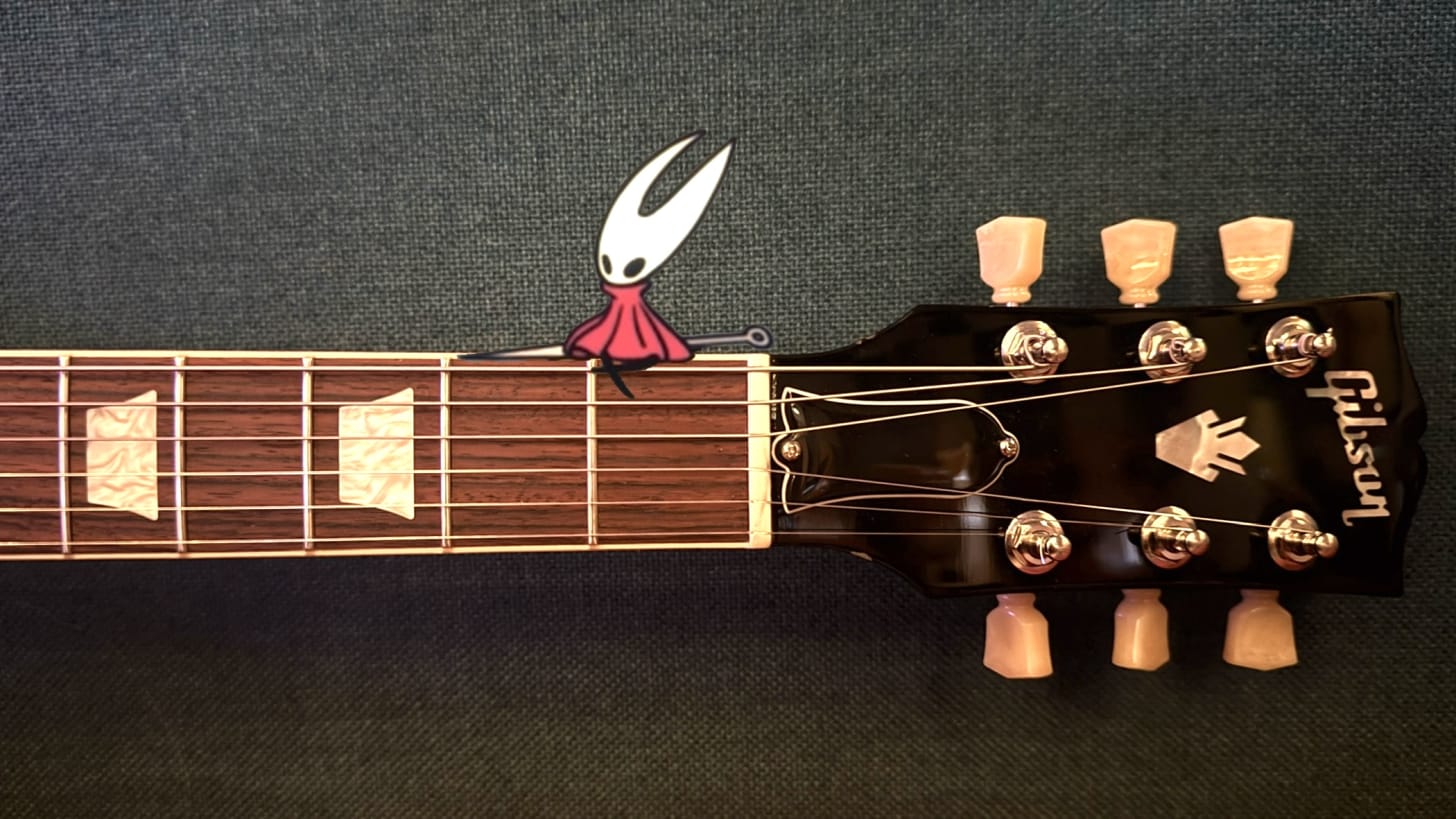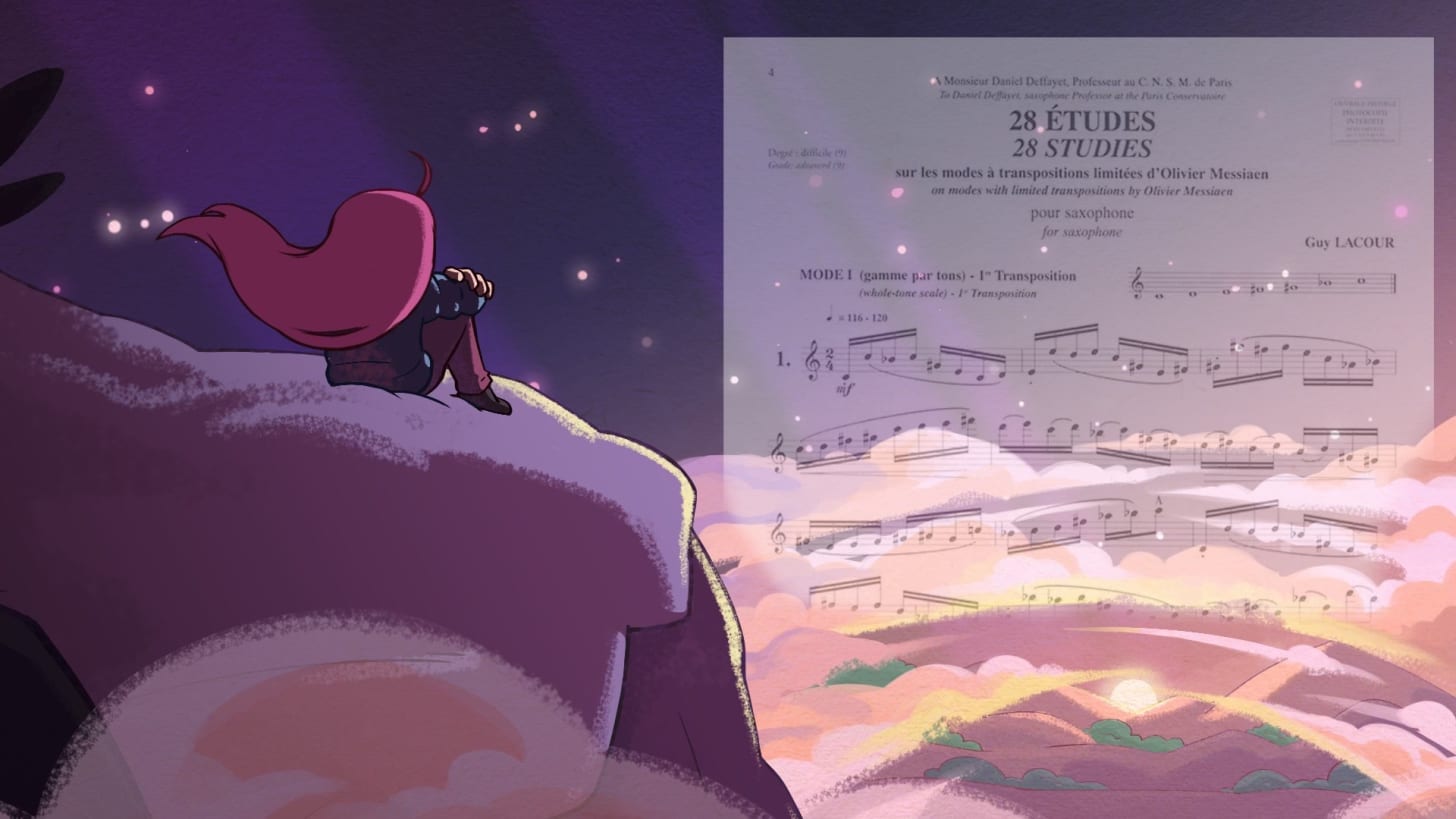Practicing music and practicing a video game are similar, at least on a basic level. Both involve training your mind to quickly follow unfamiliar patterns, and both involve mastering a series of complex, timed finger motions. When I’m learning a difficult video game boss fight, I can feel it using the same part of my brain I use to learn difficult music. There are significant differences between the two things as well, of course.
I find practicing music to be satisfying and restorative, while I often find practicing difficult video games to be exciting, stressful, and even disregulating. As I worked through one of the challenges in Hollow Knight: Silksong’s diabolical third act, my heart would start racing as I got closer to victory. If I fell short, my entire body would clench, anger and frustration pulling my muscles tight. When I finally triumphed, I felt a mad rush of joy, followed by a jittery adrenaline hangover, a cored-out sort of relief. I had to stop playing the game after dinner because it was messing up my sleep.

That couldn’t be further from how I feel when I practice music. Performing music is often exciting and stressful, but practicing? Nah. I turn on the metronome and begin to work, progressing slowly day after day. I connect with my body and my breathing, descending into a steady flow state. A week after I begin working on something, I look back on my growth and feel deeply satisfied.
Given that, in one sense, the two outcomes are so similar—my fingers can do a thing they couldn’t do before—why is the emotional experience so different? Surely part of it relates to the differences between my comfort level with music (high) and with 2D platforming games (mid). But it’s also because of the particular way that video games teach, and the restrictions they impose on the learner.
Games, especially challenging ones like Silksong, expect the student (aka the player) to learn while providing relatively few assists. You can’t slow the tempo; you can’t break things up into smaller bits. You can’t work on the third phase of a boss fight without getting through the first two; you can’t practice the final jumps of a platforming gauntlet without working your way up to it. Fighting a boss in Silksong is like picking up a brand new, challenging piece of music, and then immediately sight-reading it, on stage, at full tempo. If you make too many mistakes, you have to stop and try again from the beginning. It’s full speed, all or nothing. Of course it’s stressful!
By contrast, when practicing a difficult piece of music, I almost always break up and slow down whatever I’m working on. I’ll use a metronome to dramatically drop the tempo, and will only increase the speed when I can play it without making any mistakes. I’ll break longer sections into smaller pieces, mastering individual bars or phrases before slowly knitting them back together. I’ll progress slowly and methodically, and if I ever feel flustered or frustrated, it’s usually a sign that I need to take a break or slow down.
Those differences are noteworthy because games are, in many other ways, structured to facilitate learning. They scaffold their challenges like an étude book or a teacher’s curriculum, starting off relatively easy and increasing in difficulty and complexity over time. Plenty of action games include a training mode where you can practice moves in a safe environment. And some rare games go further, like the wonderful (and challenging) 2018 platformer Celeste, which among other unusually granular options allows players to adjust the game speed, letting them truly practice the inputs required to overcome a challenge.
Celeste is the exception to the rule. Video games are designed primarily for entertainment, and in the eyes of many game designers, an action game’s entertainment value derives primarily from its challenge. It’s in the daunting size and deafening roars of the monster who has beaten you a dozen times, in the tightness in your chest as you draw near to victory, and in the thrill of the moment as you finally land the decisive blow. I understand why a game designer might worry that slowing things down and breaking them up would encourage learning at the cost that dramatic gameplay narrative. (I’m not sure I agree, but then, I don’t make video games.) As Dark Souls director Hidetaka Miyazaki told Wired in 2016, he wants to make games “that give players a sense of accomplishment by overcoming tremendous odds.” Difficult games like Silksong and Dark Souls do teach you to play them, albeit mercilessly. The difficulty of each lesson is the heart of the experience.
In contrast, practicing music isn’t meant to be a thrilling or dramatic challenge on its own. It’s a path toward increasing one’s technical and conceptual ability. Even mastery isn’t an end unto itself; it merely allows a person to enrich their artistic voice and better express themselves. In fact, the most beautiful music is often the most effortless.
And that’s the relevant distinction: A musician is an artist, and practicing is a means to better create art. A person playing a video game is an audience member, and practicing is a means to better experience art. It’s not quite so cut and dried in reality, of course; one of the beguiling things about games is how they can blur the lines between passive audience members and active artistic participants. But generally speaking, an action game’s challenge is a primary focus of the experience, while a musical challenge is something you pass through en route to where you’re really going.
Those differences being what they are, I still wish more games included more varied practice tools, and that more game designers allowed players to learn in a less frustrating way. I’ve seen Celeste described as the rare video game that will help you get better at other games, and that strikes me as something to emulate. Practicing is the process through which we make the impossible possible; it’s one of the coolest things humans can do. Video games, far more than other modern art forms, have an inherent ability to teach their audience to more fully experience them. Why not seize the opportunity?
Ray Brown Trio - Summer Wind (Live at the Loa) - This album came on the radio last night, and it absolutely destroys. Gene Harris on piano, 🔥 - I almost had to pull the car over.
Little Dragon - Slugs of Love - My buddy Benjamin turned me onto this Swedish group, with Yukimi Nagano providing lead vocals. Great stuff.
JD McPherson - Nite Owls - As I’ve been watching Sterlin Harjo’s new Tulsa-set show “The Lowdown,” I’ve had my phone in permanent Shazam mode. This is one of many great records I’ve added to the rotation.
Ken Pomeroy - Cruel Joke - This, which to be clear is from a lady singer/songwriter and not the basketball guy, is another one. Great record, lovely songs.
Gotye - Like Drawing Blood - A musician I don’t always get around to, and then when I do, I’m always glad. A songwriter who thinks like the percussionist he is, with a remarkable ability to knit together disparate styles.
Paul Cornish - You’re Exaggerating! - A killer new record from pianist Cornish along with Joshua Crumbly and Jonathan Pinson on bass and drums. If Blue Note wants to harken back to its heyday by putting out records like this, I’m here for it.
Joni Mitchell - Mingus - Joni might not have won the final round of the Strong Songs bracket vote, but it’s likely she’ll be in the upcoming season nonetheless. I’ve been listening to her jazz recordings, and in particular like Mingus, and her take on “Goodbye Pork Pie Hat.”
The Zombies - Odessey and Oracle - This was a pick from the Strong Songs discord listening club. I knew of the Zombies, of course, and knew several of the most famous songs on this album. But it’s a whole other thing listening to the record start to finish. Great band.
The Beths - Straight Line Was a Lie - I’m not even sure how I got into The Beths, which means some algorithm was probably responsible. They’re a lot of fun, though, a sort of straight ahead, 90s-inflected rock that’s easy to put on in just about any scenario.
Bob Dylan - Slow Train Coming - Of all the Dylan records I carried out of my recent Bob Dylan-focused bonus episode, Slow Train Coming is the one I’ve come back to the most.
J.J. Cale - Naturally - One last Discord listening club pick, and the album that introduced me to Cale and the Tulsa sound. “The Lowdown” naturally featured one of Cale’s songs in its first episode.
That’ll do it for now. As ever, I’m over on Instagram and Bluesky, posting when I think of it, which isn’t that often.
I’ll leave you with this pic Emily took of Appa, mid-shake at the river yesterday. May we all take such joy in drying off.
Take care, and keep listening-
~KH
10/15/2025
.png)




